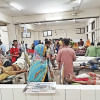Ordeal of an AIDS patient
Sultana (not the real name) was shocked when refused a surgery on an abscess at a public hospital in Dhaka sometime in 2013 because of being HIV positive.
The doctor left the operating room when she informed him of having been infected by human immunodeficiency virus.
“His [doctor's] face changed immediately. Furious, he asked me how I got the disease, insinuating that I was a bad woman.”
The 30-year-old was then asked to go to a private hospital.
She instead went to another public hospital, Shaheed Suhrawardy Medical College Hospital. This time, she chose to hide her illness to get the operation done.
This is not the first time she was secretive about her health. Only a few of her parents' and in-laws' family members know that she has AIDS (acquired immune deficiency syndrome), a disease so rare in Bangladesh that less than 0.1 percent of the population have contracted it, according to the annual progress report of Bangladesh 2015 on HIV/AIDS.
“On my mothers' side, none but my mother knows about it. This is because they would have a bad idea about me [if they were told this],” Sultana said on March 10.
She suspects that her first husband from Jessore transmitted the virus to her. She had a son who died in 2008 probably of AIDS without any diagnosis and treatment, she said.
After the breakup of the marriage in 2011, she married a man from Demra. To help the family, she went to Jordan with a job of domestic worker the next year.
However, she was diagnosed with AIDS just a week later and was subsequently deported home.
Sultana then saw a doctor in the capital's Gulistan. The physician terrified her, saying AIDS is a dangerous disease, and advised her not to tell anyone about it.
“I was told police would arrest me if they learnt about it.”
The doctor had her go through a number of tests and then suggested homoeopath medicines that cost her more than Tk 25,000 only to leave her poorer.
Watching a TV commercial, she went to a diagnostic centre and got herself tested for AIDS. The centre referred her to an NGO that has since been providing her with antiretroviral therapy given to control the virus so an AIDS patient can live a longer, healthier life with reduced risk of transmitting the virus to others.
Sultana now works for the NGO for a living.
She had dreamt of changing her fate by working abroad, but the policies do not allow people with AIDS to work overseas, she said letting out a deep breath.
Her ordeal is similar to several thousand other patients facing social stigma and discrimination in the country.
HIV is transmitted through blood, semen, vaginal fluid or breast milk.
According to the 2015 progress report, Bangladesh has 3,674 cases registered since the detection of the first case in 1989. However, the estimated number of people living with HIV is around 9,500.
Migrant workers, drug users (those who use injections), sex workers, transgenders and male homosexuals are most vulnerable to HIV infections in Bangladesh, said Tahazzad Hossain, director (programme), of Mukto Akash Bangladesh, an NGO working to ensure better comprehensive care and treatment of people with AIDS.
While it is crucial to change the living style of vulnerable groups, removing stigma and discrimination is equally important, he said.
“Stigma and discrimination lead to HIV cases go undetected,” Tahazzad said.
According to a UN report, up to 20 percent patients avoid seeing a doctor in fear of being ostracised in Bangladesh.
The three-day 12th International Congress on AIDS in Asia and the Pacific that ended yesterday discussed the issues widely, calling for stronger care of and support to the patients.
“Do not neglect HIV patients. Stand by their sides. They are human beings and deserve equal dignity,” Health Minister Mohammed Nasim said at the closing ceremony.

 For all latest news, follow The Daily Star's Google News channel.
For all latest news, follow The Daily Star's Google News channel. 








Comments